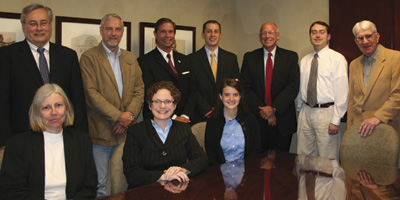 Wisconsin Lawyer
Wisconsin Lawyer
Vol. 84, No. 2, February 2011

Professionalism Committee members, seated from left: Dyann Hafner, Krista Howenstine Mauck, Erin Ogden. Standing from left: Randall Nash (chair), James Natwick, State Bar President James Boll, Clayton Kawski, K. Richard Wells, Kevin Cords (vice chair), Bruce Ehlke. Missing from photo: Paul Curtis, Hon. Patricia Gorence, John Hein, Wendy Patrickus, Sheryl St. Ores, David Werwie, Board of Governors liaison W. Craig Olafsson.
Following the tragic events that took place in Arizona in January, President Obama urged Americans to talk with each other “in a way that heals, not a way that wounds.” He gave a personalized eulogy about each victim, including 9-year-old Christina Taylor Green, whose final act of donating her organs to extend the life of another child was in stark contrast to the senseless actions of the shooter. In a tribute to the young girl, Obama asked Americans to live up to her expectations, saying “I want our democracy to be as good as she imagined it.”
Peggy Noonan, a well-known conservative columnist, stated on MSNBC that Obama’s speech focused on looking at and improving our civil discourse. In light of this tragedy, members of both political parties are talking about the need for civility in public discourse. For years, the State Bar’s Professionalism Committee has communicated to lawyers that, even though we have an obligation to zealously assert our clients’ positions under an adversary system, we also must maintain a professional, courteous, and civil attitude toward all persons involved in the legal system. SCR 20. Preamble.
According to Randy Nash, an attorney with O’Neil, Cannon, Hollman, DeJong & Laing S.C., Milwaukee, and chair of the committee, “The purpose of the Professionalism Committee is aspirational in nature; it is to remind attorneys that ethical obligations are a minimum standard of behavior, leaving room on the spectrum for better and best practices. So, for example, an attorney apparently can be acidic and annoying, and it is not a violation of the attorneys’ oath. Maybe we should aim for a higher standard.”On March 10, the committee is sponsoring a seminar, “The View from the Bench: Judges’ Expectations in the Matters that come Before Them.” Visit www.wisbar.org/seminars.
More seasoned practitioners than I talk of a time when lawyers would work hard and aggressively for their clients but still meet their legal opponents over a cup of coffee or a drink after work. Often, as the adversaries talked, they learned from each other and became better lawyers. This camaraderie, for many of them, was one of the best aspects of the practice of law.
Attorneys are advocates, negotiators, defenders, and prosecutors. Aggressive personalities are not rare in our profession; this has always been true. Why then does it appear that civility in our profession seems to be declining? Some people say it is just a reflection of the lack of civility in society. Others believe that because there are so many lawyers now, it is hard to develop the type of trust and friendship people did in the past when one frequently saw the same adversaries.
I certainly am not perfect. After practicing law for almost 20 years, there are times I wish I had been more professional in the handling of some cases. For eight tips on improving civility in law practice, see this month’s Practice Tips column.
As our nation reflects on civility in our culture, I ask that each of us rededicate ourselves to aim for higher standards than simply following the rules of professional conduct. Let’s not be an organization that mirrors society’s growing lack of civility but one that leads society to that higher plain. As American author Robert Brault wrote, ”Sometimes in tragedy we find a purpose.”
On behalf of all the members of the State Bar to the families of the people killed and injured on Jan. 8 in Arizona, our deepest sympathy and prayers are with you.
Wisconsin Lawyer
